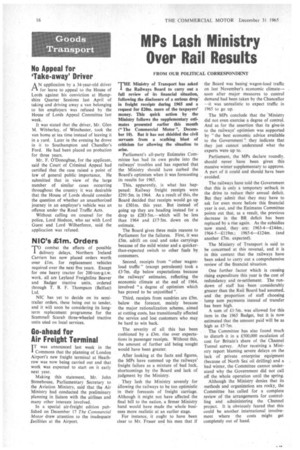MPs Lash Ministry Over Rail Results
Page 18

If you've noticed an error in this article please click here to report it so we can fix it.
FROM OUR POLITICAL CORRESPONDENT E Ministry of Transport has asked the Railways Board to carry out a full review of its financial situationy Following the disclosure of a serious drop' in freight receipts during 1965 and a request for £20m. more of the taxpayers' money. This quick action by the Ministry follows the supplementary estimates presented earlier this month ("The Commercial Motor ", December 10). But it has not shielded the civil servants from a scathing blast of criticism for allowing the situation to arise. Parliament's all-party Estimates Committee has had its own probe into the railways' troubles and has reported that the Ministry should have curbed the Board's optimism when it was forecasting its results for 1965.
This, apparently, is what has happened: Railway freight receipts were 1291-5m. in 1964. As a result of this, the Board decided that receipts would go up to £301m. this year. But instead of going up they are heading instead for a drop to £283.5m.--which will be less than 1964 and £.17-5m. down on the estimate. The Board gives three main reasons to Parliament for the failures. First, it was £5m. adrift on coal and coke carryings because of the mild winter and a quickerthan-expected switch to other fuels by consumers.
Second, receipts from " other wagonload traffic" (except petroleum) took a £3.7m. dip below expectations because the railways' estimates, reflecting the economic climate at the end of 1964, involved "a degree of optimism which has proved to be unjustified ". Third, receipts from sundries are £5m. below the forecast, mainly because the major rationalization scheme, aimed at cutting costs, has transitionally affected the service and lost customers who may be hard to win back.
The severity of all this has been cushioned by a £3m. rise over expectations in passenger receipts. Without this, the amount of further aid being sought would have been greater. After looking at the facts and figures, the MPs have summed up the railways' freight failure as a mixture of bad luck, shortcomings by the Board and lack of judgment by the Ministry.
They lash the Ministry severely for allowing the railways to be too optimistic in their forecasts of freight carriage. Although it might not have affected the final bill to the nation, a firmer Ministry hand would have made the whole business more realistic at an earlier stage. For instance, it ought to have been clear to Mr. Fraser and his men that if the Board was basing' wagon-load traffic on last November's economic climate—. soon after major measures to control demand had been taken by the Chancellor —it was unrealistic to expect traffic in 1965 to go up.
The MPs conclude that the Ministry did not even exercise a degree of control. And as for the assertion that its give-in to the railways' optimism was supported by 'the best economic advice available to the Government" they indicate that they just cannot understand what the experts were up to. Parliament, the MPs declare roundly. should never have been given this massive winter supplementary to approve. A part of it could and should have been ' avoided.
The railways have told the Government that this is only a temporary setback in the drive to reduce their annual deficit. But they admit that they may have to ask for even more before this financial year is out, and the Estimates Committee points out that, as a result, the previous decrease in the BR deficit has been replaced by a rise again. As the subsidies now stand, they are: 1963-4—£144m.; I 964-5—£ I 19m.; 1965-6—£124m. (and another £7m. expected).
The Ministry of Transport is said to be concerned at this reversal, and it is in this context that the railways have been asked to carry out a comprehensive review of the financial situation.
One further factor which is causing rising expenditure this year is the cost of redundancy and re-settlement. The rundown of staff has been considerably greater than the Rail Board had assumed, and the proportion of staff choosing lump sum payments instead of transfer has been high. A sum of £1-5m, was allowed for this item in the 1965 Budget, but it is now estimated that the amount paid will be as high as £5.7m. The Committee has also found much to disturb it in a £500,000 escalation of cost for Britain's share of the Channel Tunnel survey. After receiving a Ministry report blaming severe delays on the lack of private enterprise equipment (because of North Sea' oil drilling) and a bad winter, the. Committee cannot understand why the Government did not call off the whole operation until the spring. Although the Ministry denies that its methods and organization are rocky, the Committee has called for a complete review of the arrangements for controlling and administering the Chunnel project. It is obviously feared that this could be another international involvement where the costs might get completely out of hand.




















































































